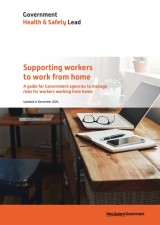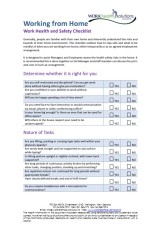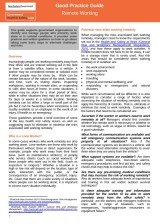You can now add Healthify as a preferred source on Google. Click here to see us when you search Google.
Working from home
Key points about working from home
- COVID-19 changed our working lives a lot. You might have continued to work from home, or be going into the office several days a week in a ‘flexi/hybrid’ model.
- You might also be working from home while recovering from COVID, another illness, an injury or a long-term condition.
- Balancing work and home can be hard, especially if you're used to working in a team, having colleagues to spend time with, or if you’re juggling other demands of family life such as childcare or supporting another dependent person.
- All of these factors can affect your mental and physical health.
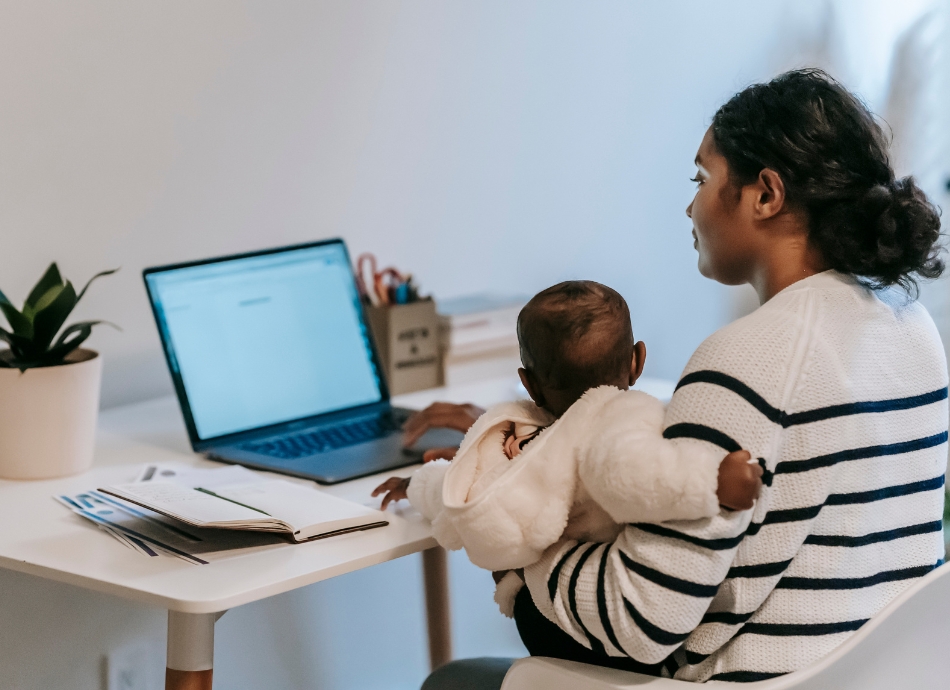
COVID-19 changed the game in terms of many people’s ability to spend their working week outside the ‘traditional’ office. While many people have returned to their place of work, flexible working (some time in the office and some time working from home each week) has become more common.
According to New Zealand government statistics(external link), about a third of employees in Aotearoa New Zealand were working from home in September 2024.
When employees work from home, their home is treated as a workplace. Both the employee and the employer are responsible for keeping it safe. They must work together to reduce any health and safety risks(external link) according to the Health and Safety at Work Act 2015.
While most people have adjusted to working from home it can be hard, or feel isolating, especially if you're used to having work colleagues and friends to spend time with.
Things that could put you at risk include:
- not having a good space to work in
- having no boundaries between work and home life
- not having the things you need to do your job, eg, tools, computer, desk, software
- lack of social support
- having too much work to do, time pressures or a lack of flexibility in your schedule.
Talk to your employer
The most important thing you can do is talk to your employer about managing your work at home. They have a responsibility to ensure you have a safe work environment and that includes protecting your mental health. For example, it's good to talk about:
- getting any equipment or technology you need for doing your job at home
- which of your tasks are more suited to doing at home
- how to stay in touch with your team and your boss so you don’t feel too isolated
- being more flexible with deadlines and expectations while you’re working from home
- the option of spending some time in the office, eg, for meetings or workshops
- any problems you’re having, including managing home life and emotional distress, so that you can work together to find solutions.
Things you can do for yourself:
- Set up a suitable workspace that you feel happy to work in.
- Try to maintain boundaries between work and home life by working in a separate room or covering your work area with a sheet or blanket when it’s home time.
- Get outside for some light exercise each day.
- Take breaks away from your workspace and stick to your schedule so work time doesn’t take over your family, social or relaxation time.
- Organise virtual catch-ups with friends, whānau and workmates over lunch.
- Go easy on yourself. Depending on your situation, you might not be as productive as normal and that’s OK.

Image credit: Canva
Working from home can cause physical injuries if your workstation isn't comfortable. Your employer is responsible for doing what they can to make sure you don’t get injured at work. Talk to them about whether you might need a health and safety risk assessment, especially if you’re going to be working at home for more than just a few days.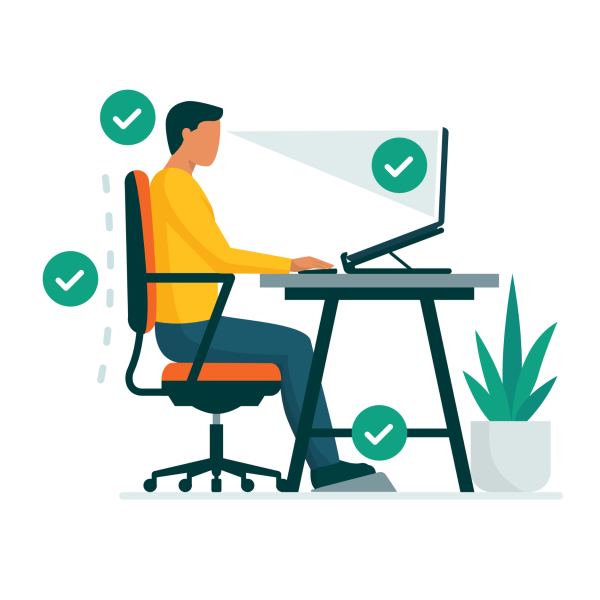
Image credit: Depositphotos
Some employers will reimburse employees for any additional equipment they need to buy or will pay an allowance to cover working at home costs such as power, internet and telephone. Talk to your boss about these things.
More information is available on the workplace safety page.
Employees can ask to work from home, no matter how long they’ve been with the company. The request needs to be in writing, but you don’t have to give a specific reason. Your employer has 1 month to respond. If they say no, they must provide a valid business reason for their decision(external link).
If you think you're being treated unfairly while you have to work at home, consider getting support from your union. If you’re not a member of a union you can look up which union to contact(external link).
Taking sick leave
It's important to take sick leave when you need it, whether you're due in at the office or working from home. It's tempting, for you and your employer, to think you can continue to work from home if you're unwell as you're not putting any of your colleagues at risk of catching something. However, continuing to work when you're not well (mentally or physically) can lead to:
- lower productivity
- mistakes being made
- accidents happening
- slower recovery.
If you need sick leave when you're working from home, call your employer and tell them you won't be working. You don't have to go into details, but giving them some sense of what's wrong and how much time you think you might need off is helpful for you and them.
In general, working from home when you're not well can do more harm than good.
Overseas workers
Remember that you have the same employment rights as all other New Zealand workers. Learn more about migrant workers' rights.(external link)
Illnesses such as COVID-19 can leave you with symptoms that may include tiredness, breathlessness and poor concentration. COVID can also develop into long COVID.
Working while managing a long-term health condition or recovering from an injury can be challenging, so it’s important to let your employer know what you need, and how much and how often you can work.
Talk to your boss
If you're living with a debilitating condition or recovering from an illness or injury, the most important thing you can do is talk to your employer about your needs and any adjustments that could be made.
It might be good to discuss:
- Returning to work gradually as you recover.
- Working from home until you feel able to travel to work again.
- Being flexible about when you work depending on your symptoms.
- What sick leave or other entitlements you have to cover your time off.
What if I’ve run out of sick leave?
If you have run out of sick leave or you’re not entitled to it yet(external link), you may be able to get financial support from Work and Income. Find out more about eligibility for financial support from Work and Income(external link), or phone 0800 559 009 to find out what help they can provide.
Need support?
Talk to your healthcare provider about your working conditions and your health. They can support you by providing medical certificates and making recommendations about a suitable return to work plan.
Look after yourself
It's important to take good care of yourself while you're recovering from illness or injury. Doing too much too soon, especially after COVID-19 can slow down your recovery. As you return to work, these tips for managing your symptoms may be useful for your planning.
If your job involves physical activity, it's important to think about how to return to it safely. You can share this information about returning to exercise with your employer, as you talk through a gradual return to work.
Employees in the recovery period after illness, or who are dealing with a long-term condition such as long COVID can experience a variety of symptoms that may come and go. Their mental health may also have been impacted, especially if they have a pre-existing condition, an injury or have been in hospital.
How to support the return to work
Feeling cared for by an employer greatly increases the chance of return to work after illness or injury.
Here are some things you might discuss while planning an employee’s return to work:
- Plan a gradual or phased return to work.
- Offer part time or reduced hours.
- Support them to work from home until they feel able to travel to work again.
- Offer flexibility to work around ongoing symptoms.
- Provide information and reassurance about sick leave or other entitlements they have, to cover any further time off required.
- Alter tasks to support their physical recovery, eg, starting them off with light duties only.
- Allow time off for appointments.
- Adjust their workspace to help with impaired concentration.
- Encourage them to pace themselves with breaks and rest as required.
Read more about recovery at work.
Brochures
Supporting workers to work from home(external link) New Zealand Government, NZ, 2024
Good practice guide – working remotely(external link) New Zealand Government, NZ
Working from home – work health and safety checklist(external link) Work Health Solutions Ltd, NZ, 2020
References
- Taking sick leave(external link) Employment New Zealand, NZ, 2025
- Staying mentally healthy when working from home(external link) Worksafe NZ, 2021
- Feel guilty taking sick leave? Don't – soldiering on is so pre-pandemic(external link) Radio New Zealand, 2024
- Being flexible on flexible working in 2023(external link) Duncan Cotterill, NZ, 2023
- Looking after your employees(external link) Business.govt.nz, NZ
- Stopping work because of health condition or disability(external link) Work and Income NZ
- Labour market statistics – September 2024 quarter(external link) Stats NZ, 2024(external link)
- Flexible working(external link) Employment New Zealand, NZ, 2024
- Migrant exploitation(external link) Employment New Zealand, NZ, 2024
Brochures
Credits: Healthify editorial team. Healthify is brought to you by Health Navigator Charitable Trust.
Last reviewed:





